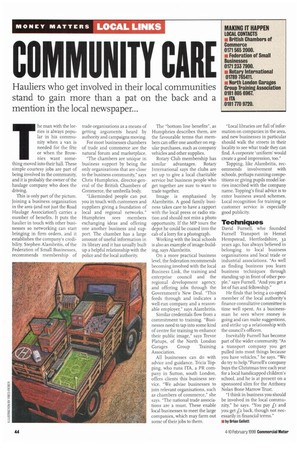CO UNITY CARE
Page 46

If you've noticed an error in this article please click here to report it so we can fix it.
Hauliers who get involved in their local communities stand to gain more than a pat on. the back and a mention in the local newspaper...
The man with the lorries is always popular in his community when a van is needed for the fete or when the Brownies want something moved into their hall. These simple courtesy jobs are part of being involved in the community, and it is probably the owner of the haulage company who does the driving.
This is only part of the picture. joining a business organisation in the area (and not just the Road Haulage Association!) carries a number of benefits. It puts the haulier in touch with other businesses so networking can start bringing in firm orders, and it establishes the company's credibility. Stephen Alambritis, of the Federation of Small Businesses, recommends membership of trade organisations as a means of getting arguments heard by authority and campaigns moving.
For most businesses chambers of trade and commerce are the natural forum and marketplace.
"The chambers are unique in business support by being the only organisations that are close to the business community," says Chris Humphries, director-general of the British Chambers of Commerce, the umbrella body.
"Likeminded people can put you in touch with customers and suppliers giving a foundation of local and regional networks." Humphries sees members exchanging ideas and offering one another business and support. The chamber has a large amount of useful information in its library and it has usually built up a helpful relationship with the police and the local authority. The "bottom line benefits", as Humphries describes them, are the favourable terms that members can offer one another on regular purchases, such as company vehicles and other supplies.
Rotary Club membership has similar advantages. Rotary International says the clubs are set up to give a local charitable service but business people who get together are sure to want to trade together.
Image is emphasised by Alambritis. A good family business takes care to have a rapport with the local press or radio station and should not miss a photo opportunity. If the MP tours the depot he could be coaxed into the cab of a lorry for a photograph.
Working with the local schools is also an example of image-building, says Alambritis.
On a more practical business level, the federation recommends becoming involved with the local Business Link, the training and enterprise council and the regional development agency, and offering jobs through the Government's New Deal. "This feeds through and indicates a well-run company and a reasonable employer," says Alambritis.
Similar credentials flow from a commitment to training. "Businesses need to tap into some kind of centre for training to enhance their public image," says Trevor Platups, of the North London Garages Group Training Association.
All businesses can do with advice and guidance. Tricia Topping, who runs ITA, a PR company in Sutton, south London, offers clients this business service. "We advise businesses to join relevant organisations, such as chambers of commerce," she says. "The national trade associations are a must. These enable local businesses to meet the large companies, which may farm out some of their jobs to them. "Local libraries are full of information on companies in the area, and new businesses in particular should walk the streets in their locality to see what trade they can find. A corporate 'uniform' would create a good impression, too."
Topping, like Alambritis, recommends involvement with schools, perhaps running competitions or giving pupils model lorries inscribed with the company name. Topping's final advice is to enter business award schemes. Local recognition for training or customer service is especially good publicity.
Techniques
David Furnell, who founded Furnell Transport in Hemel Hempstead, Hertfordshire, 32 years ago, has always believed in belonging to local business organisations and local trade or industrial associations. "As well as finding business you learn business techniques through standing up in front of other people," says Furnell. "And you get a lot of fun and fellowship."
He finds that being a co-opted member of the local authority's finance consultative committee is time well spent. As a businessman he sees where money is going and can make suggestions, and strike up a relationship with the council's officers.
Inevitably Furnell has become part of the wider community. "As a transport company you get pulled into most things because you have vehicles," he says. "We do try to help."Furnell's company buys the Christmas tree each year for a local handicapped children's school, and he is at present on a sponsored slim for the Anthony Nolan Bone Marrow Trust.
"I think in business you should be involved in the local community," he says. "You pay Li and you get £2 back, though not necessarily in financial terms."
• by Brian Collett








































































































